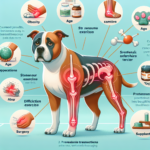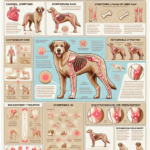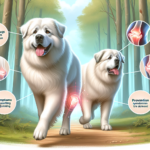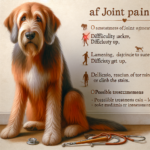Ibizan Hound Joint Pain: Causes, Symptoms, Prevention, and Treatment
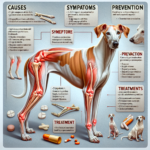
Introduction
The Ibizan Hound, also known as the “Beezer,” is a breed with a rich history dating back to ancient Egypt. These elegant and athletic dogs were originally bred for hunting rabbits and other small game on the Balearic Islands of Spain. Known for their agility, speed, and keen sense of sight and smell, Ibizan Hounds are characterized by their slender build, large ears, and expressive eyes. They are affectionate, intelligent, and make excellent companions for active families.
Like many breeds, Ibizan Hounds are prone to certain health issues, with joint pain being a significant concern. Joint health is crucial for maintaining the breed’s agility and overall quality of life. Understanding the causes, symptoms, prevention, and treatment of joint pain in Ibizan Hounds can help owners ensure their pets remain healthy and active.
Breed-Specific Joint Pain Risks
Genetic Predisposition
Ibizan Hounds, like many purebred dogs, have a genetic predisposition to certain joint-related issues. Hip dysplasia, a condition where the hip joint doesn’t fit properly into the hip socket, is one such concern. This can lead to arthritis and significant pain over time. Elbow dysplasia, another genetic condition, affects the elbow joint and can cause similar issues. While not all Ibizan Hounds will develop these conditions, their genetic makeup makes them more susceptible.
Age-Related Risks
As Ibizan Hounds age, the risk of joint pain increases. The breed typically reaches senior status around 7-8 years of age. During this time, the wear and tear on their joints from years of activity can lead to arthritis and other degenerative joint diseases. It’s essential for owners to monitor their dogs closely as they age and be aware of any changes in mobility or behavior that could indicate joint pain.
Activity Level and Joint Stress
Ibizan Hounds are known for their high energy levels and love of running and jumping. While regular exercise is crucial for their overall health, excessive or inappropriate activity can put undue stress on their joints. Activities that involve a lot of jumping or sudden stops and starts can be particularly hard on their joints. Owners should balance their dog’s need for exercise with the potential risk of joint stress.
Common Symptoms of Joint Pain in Ibizan Hounds
General Symptoms
- Limping or favoring one leg
- Stiffness, especially after rest
- Reluctance to climb stairs or jump
- Decreased activity or playfulness
- Swelling around the joints
- Whining or showing signs of discomfort when touched
Breed-Specific Symptoms
While the general symptoms of joint pain are similar across breeds, Ibizan Hounds may exhibit some breed-specific signs. Due to their lean build and high energy levels, a noticeable decrease in activity or reluctance to run and play can be a significant indicator of joint pain. Additionally, their expressive nature may make them more likely to vocalize discomfort.
When to Consult a Vet
If an Ibizan Hound shows any signs of joint pain, it’s essential to consult a veterinarian promptly. Early intervention can prevent further damage and improve the dog’s quality of life. Owners should seek veterinary advice if their dog exhibits persistent limping, significant changes in activity levels, or any signs of pain or discomfort.
Preventive Measures for Joint Health
Exercise Recommendations
Regular, moderate exercise is crucial for maintaining joint health in Ibizan Hounds. Activities like walking, swimming, and controlled running can help keep their joints flexible and muscles strong without causing excessive stress. Avoid high-impact activities like jumping or sudden changes in direction, which can strain their joints.
Dietary Suggestions
A balanced diet rich in essential nutrients can support joint health. Foods containing glucosamine, chondroitin, and omega-3 fatty acids are particularly beneficial. These nutrients help maintain cartilage health and reduce inflammation. Owners may also consider joint supplements, but it’s essential to consult a veterinarian before adding any new supplements to their dog’s diet.
Weight Management
Maintaining a healthy weight is crucial for reducing joint stress. Excess weight puts additional pressure on the joints, exacerbating pain and increasing the risk of arthritis. Owners should monitor their dog’s weight and adjust their diet and exercise routine as needed to keep them at an optimal weight.
Early Screening and Monitoring
Regular veterinary check-ups are essential for early detection of joint issues. Vets can perform screenings for conditions like hip and elbow dysplasia and monitor for signs of arthritis. Early intervention can significantly improve outcomes and help manage joint pain more effectively.
Treatment Options for Joint Pain
Non-Surgical Treatments
Non-surgical treatments for joint pain in Ibizan Hounds include medications, physical therapy, and lifestyle adjustments. Anti-inflammatory drugs and pain relievers can help manage pain and reduce inflammation. Physical therapy, including exercises and massage, can improve joint mobility and strength. Lifestyle adjustments, such as providing a comfortable bed and avoiding high-impact activities, can also help manage joint pain.
Surgical Options
In severe cases, surgical intervention may be necessary. Common surgeries for joint pain include hip replacement, arthroscopy, and joint fusion. These procedures can significantly improve the dog’s quality of life, but they come with risks and require a lengthy recovery period. Owners should discuss the potential benefits and risks with their veterinarian to determine the best course of action.
Alternative Therapies
Alternative therapies like acupuncture, hydrotherapy, and massage can also benefit Ibizan Hounds with joint pain. Acupuncture can help reduce pain and inflammation, while hydrotherapy provides low-impact exercise that strengthens muscles without stressing the joints. Massage can improve circulation and reduce muscle tension, providing relief from joint pain.
Lifestyle and Management Tips
Daily Care Routine
A daily care routine for an Ibizan Hound with joint pain should include gentle exercise, a balanced diet, and regular monitoring for signs of discomfort. Short, frequent walks can help maintain joint flexibility without causing excessive stress. Providing a comfortable, supportive bed and avoiding slippery surfaces can also help manage joint pain.
Modifying the Home Environment
Making the home environment more comfortable for a dog with joint pain can significantly improve their quality of life. Consider using ramps instead of stairs, providing orthopedic beds, and ensuring food and water bowls are at a comfortable height. Non-slip mats can also help prevent falls and reduce joint strain.
Long-Term Management
Long-term management of joint pain involves regular veterinary check-ups, ongoing monitoring of the dog’s condition, and adjustments to their care routine as needed. Owners should remain vigilant for any changes in their dog’s behavior or mobility and consult their veterinarian promptly if they notice any signs of worsening joint pain.
FAQs About Ibizan Hounds and Joint Pain
What are the early signs of joint pain in Ibizan Hounds?
Early signs of joint pain in Ibizan Hounds include limping, stiffness, reluctance to climb stairs or jump, and decreased activity levels. Owners should monitor their dogs closely for these symptoms and consult a veterinarian if they notice any changes.
Can joint pain in Ibizan Hounds be prevented?
While it’s not always possible to prevent joint pain entirely, owners can take steps to reduce the risk. Regular, moderate exercise, a balanced diet rich in joint-supporting nutrients, and maintaining a healthy weight can all help support joint health. Early screening and regular veterinary check-ups are also crucial for catching joint issues early.
Are there specific exercises that are better for Ibizan Hounds with joint pain?
Low-impact exercises like walking and swimming are ideal for Ibizan Hounds with joint pain. These activities help maintain joint flexibility and muscle strength without causing excessive stress. Owners should avoid high-impact activities like jumping or sudden changes in direction.
What dietary supplements can help with joint pain in Ibizan Hounds?
Supplements containing glucosamine, chondroitin, and omega-3 fatty acids can support joint health and reduce inflammation. However, it’s essential to consult a veterinarian before adding any new supplements to the dog’s diet to ensure they are appropriate and safe.
When should I consider surgery for my Ibizan Hound’s joint pain?
Surgery should be considered when non-surgical treatments are no longer effective, and the dog’s quality of life is significantly impacted by joint pain. Common surgical options include hip replacement, arthroscopy, and joint fusion. Owners should discuss the potential benefits and risks with their veterinarian to determine the best course of action.
Conclusion
Joint pain is a significant concern for Ibizan Hounds, but with proper care and attention, owners can help their dogs maintain healthy joints and a good quality of life. Regular exercise, a balanced diet, weight management, and early screening are all crucial for preventing and managing joint pain. If joint pain does develop, a combination of non-surgical treatments, surgical options, and alternative therapies can provide relief and improve the dog’s quality of life. By staying vigilant and working closely with their veterinarian, owners can ensure their Ibizan Hounds remain active and happy for years to come.

